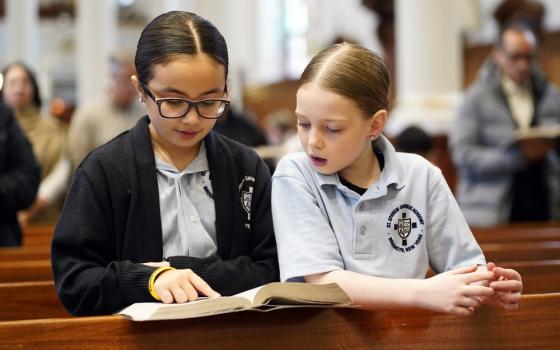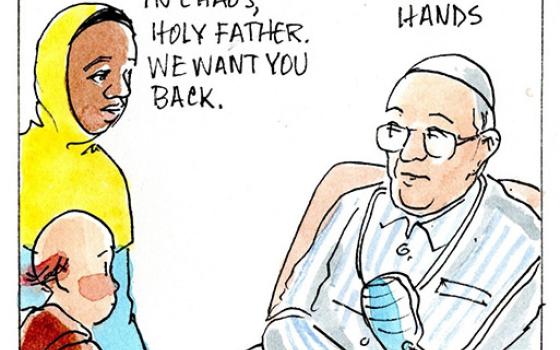
Jaeynes Childers and Maria Balata, members of the Chicago Archdiocesan Gay and Lesbian Outreach, hold hands at Our Lady of Mount Carmel Church June 19. (CNS/Karen Callaway, Catholic New World)
On the Saturday after Christmas Day last year, I attended Mass with someone I love. This person is not a regular churchgoer and also happens to be gay. Because it was the feast of the Holy Family, the priest saw fit to treat the congregation to a litany of what he perceived to be the most serious threats to the family unit. Homosexuality and bestiality topped the list.
Even Catholics with orthodox views on sexuality should have found the homily brash and insensitive in its delivery. I was embarrassed, angry, and, perhaps most of all, disappointed by the missed opportunity. A great deal of modern society sees the Catholic church as judgmental and repressive, a reputation that moments like these make hard to refute.
Though I think some critiques of contemporary Catholicism are valid, these negative modifiers are far from my experience with the faith. The vast majority of sisters, brothers, priests and laypeople I know have shown me kindness, consideration, and more leniency than I grant myself. I wanted to tell my loved one that this priest was not reflective of the church I know, that unconditional love and generosity are its true markers. On this day, however, the perception of a mean, stern, out-of-touch religion was reinforced.
I have thought a lot about that Mass since the shooting at a gay club in Orlando several months ago. Despite the alarming frequency of gun violence in the United States, I want to think of attacks targeted at a specific group as an aberration. Who doesn't? Anyone concerned with homophobia takes solace in our society's steps toward greater equality. Sure, we recognize ongoing intolerance, but people who explicitly hold bigoted views can seem so far from our circles that they barely appear real. When events like the Orlando shooting or even the feast of the Holy Family homily cast prejudice into the open, we are shocked.
I wonder if members of the lesbian, gay, bisexual, transgender, queer, intersex and asexual community experience the same disbelief. Several months after that Mass, I was having drinks with friends, some of whom are gay. My gay friends casually traded stories of epithets they hear thrown at them while walking New York City's streets. The members of our group who are not gay were astonished to learn this, which says something about our scorecard as allies.
Plenty of Catholic organizations and individuals weighed in after Orlando. Some offered supportive but vague comments that ignored the fact that a specific community was targeted (e.g., "Every life is sacred"), while others were more forthright (e.g., "We must be in solidarity with our gay, lesbian, bisexual, and transgender sisters and brothers"). I do not expect to persuade anyone toward my views, which are admittedly in line with the latter response. On this topic, I think most Catholics know how they and their detractors feel.
But how many of us know how LGBTQIA Catholics and non-Catholics alike feel? Not just about hot button issues, but how they feel as they go about their days, enduring slights at work, during their free time, or, God forbid, at church?
One of the saddest parts of the homily I witnessed was that my loved one did not seem surprised by it. This was what he had come to expect from the church. As enlightened as I like to think I am, my stunned reaction reveals my ignorance. Who knows how many other prayers or discussions I have sat through, oblivious to subtler insults directed toward somebody seen as "other"?
I am well aware of the Catholic church's official position on marriage and sexuality. I also realize that unwavering trust in the wisdom of that teaching will limit the extent to which some Catholics feel they can reach out to the LGBTQIA community.
Regardless, I think all Catholics would do well to accept the notion that unflattering assumptions about our religion are not solely the result of others misunderstanding or rebelling against it. The fact that Catholicism has been a source of comfort for many does not mean it has been for all. We ought to consider the implications of this realization.
Before we respond by drafting new mission statements or developing better tools for evangelization, we might ask those who are skeptical of Catholicism why they feel the way they do, or whether they hear the same things we do when they go to Mass. It might be a fruitless endeavor, one that fails to convince anyone that Catholicism is ultimately about love. But maybe this is one of those instances that calls not for others' conversion so much as our own.
[Brian Harper is a writer whose work has been featured in America magazine, the Milwaukee Journal Sentinel, the National Catholic Reporter, and various other publications. You can find it at brianharper.net.]
Editor's note: We can send you an email alert every time a Young Voices column is posted to NCRonline.org. Go to this page and follow directions: Email alert sign-up.

